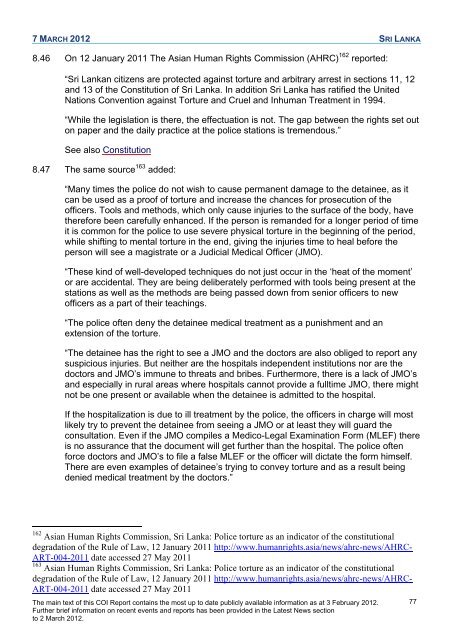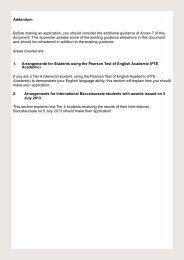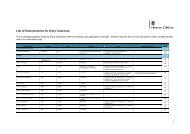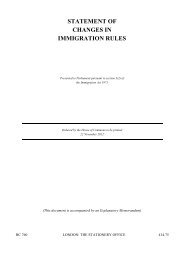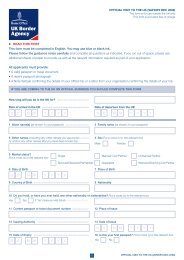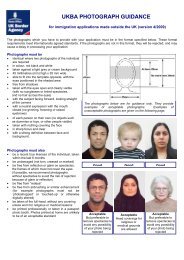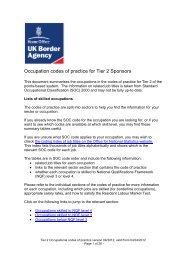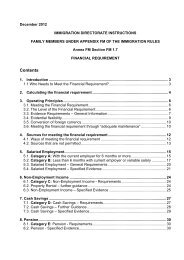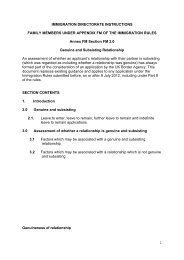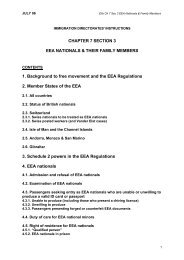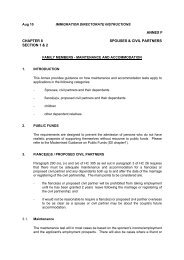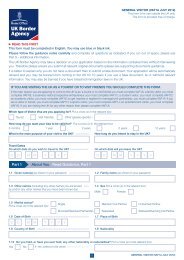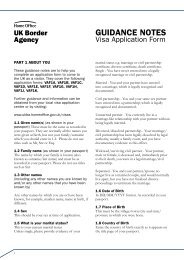COI Report March 2012 - UK Border Agency - Home Office
COI Report March 2012 - UK Border Agency - Home Office
COI Report March 2012 - UK Border Agency - Home Office
You also want an ePaper? Increase the reach of your titles
YUMPU automatically turns print PDFs into web optimized ePapers that Google loves.
7 MARCH <strong>2012</strong> SRI LANKA<br />
8.46 On 12 January 2011 The Asian Human Rights Commission (AHRC) 162 reported:<br />
―Sri Lankan citizens are protected against torture and arbitrary arrest in sections 11, 12<br />
and 13 of the Constitution of Sri Lanka. In addition Sri Lanka has ratified the United<br />
Nations Convention against Torture and Cruel and Inhuman Treatment in 1994.<br />
―While the legislation is there, the effectuation is not. The gap between the rights set out<br />
on paper and the daily practice at the police stations is tremendous.‖<br />
See also Constitution<br />
8.47 The same source 163 added:<br />
―Many times the police do not wish to cause permanent damage to the detainee, as it<br />
can be used as a proof of torture and increase the chances for prosecution of the<br />
officers. Tools and methods, which only cause injuries to the surface of the body, have<br />
therefore been carefully enhanced. If the person is remanded for a longer period of time<br />
it is common for the police to use severe physical torture in the beginning of the period,<br />
while shifting to mental torture in the end, giving the injuries time to heal before the<br />
person will see a magistrate or a Judicial Medical <strong>Office</strong>r (JMO).<br />
―These kind of well-developed techniques do not just occur in the ‗heat of the moment‘<br />
or are accidental. They are being deliberately performed with tools being present at the<br />
stations as well as the methods are being passed down from senior officers to new<br />
officers as a part of their teachings.<br />
―The police often deny the detainee medical treatment as a punishment and an<br />
extension of the torture.<br />
―The detainee has the right to see a JMO and the doctors are also obliged to report any<br />
suspicious injuries. But neither are the hospitals independent institutions nor are the<br />
doctors and JMO‘s immune to threats and bribes. Furthermore, there is a lack of JMO‘s<br />
and especially in rural areas where hospitals cannot provide a fulltime JMO, there might<br />
not be one present or available when the detainee is admitted to the hospital.<br />
If the hospitalization is due to ill treatment by the police, the officers in charge will most<br />
likely try to prevent the detainee from seeing a JMO or at least they will guard the<br />
consultation. Even if the JMO compiles a Medico-Legal Examination Form (MLEF) there<br />
is no assurance that the document will get further than the hospital. The police often<br />
force doctors and JMO‘s to file a false MLEF or the officer will dictate the form himself.<br />
There are even examples of detainee‘s trying to convey torture and as a result being<br />
denied medical treatment by the doctors.‖<br />
162 Asian Human Rights Commission, Sri Lanka: Police torture as an indicator of the constitutional<br />
degradation of the Rule of Law, 12 January 2011 http://www.humanrights.asia/news/ahrc-news/AHRC-<br />
ART-004-2011 date accessed 27 May 2011<br />
163 Asian Human Rights Commission, Sri Lanka: Police torture as an indicator of the constitutional<br />
degradation of the Rule of Law, 12 January 2011 http://www.humanrights.asia/news/ahrc-news/AHRC-<br />
ART-004-2011 date accessed 27 May 2011<br />
The main text of this <strong>COI</strong> <strong>Report</strong> contains the most up to date publicly available information as at 3 February <strong>2012</strong>.<br />
Further brief information on recent events and reports has been provided in the Latest News section<br />
to 2 <strong>March</strong> <strong>2012</strong>.<br />
77


